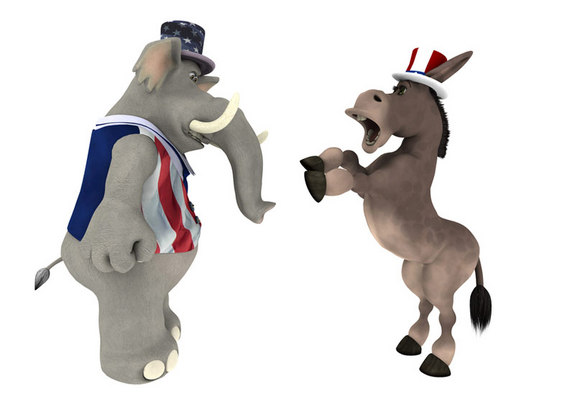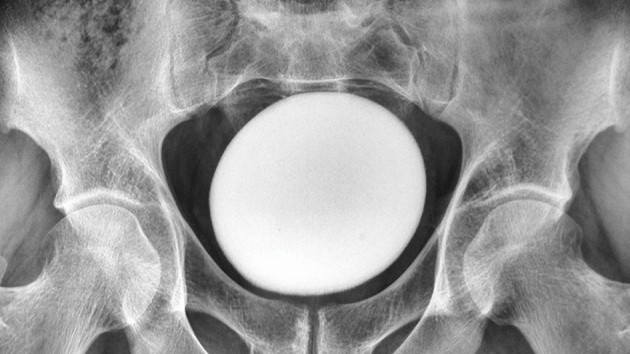Conservatives & Liberals Don't See Eye-to-Eye, Literally

If you walk away from holiday dinners fuming that conservative Uncle Morton just can't see your point of view, or that liberal Aunt Betty just doesn't get it, a new finding may make it easier to cool your jets. According to the study, conservatives and liberals pay attention to their environments differently, meaning the two sides of the political spectrum quite literally don't see eye-to-eye.
Conservatives pay more attention to negative stimuli compared with liberals, the study found.
"They're essentially monitoring things that make them feel uncomfortable, which does feel fairly consistent with conservative policies, actually," study researcher Mike Dodd, a psychologist at the University of Nebraska, Lincoln, told LiveScience. "They tend to confront things head-on that they view as threats, things like immigration and so on." [10 Significant Political Protests]
Dodd was quick to note that the kind of stimuli a person pays more attention to does not make them better or worse than someone of another political persuasion. But the findings could suggest a biological basis for political views.
"Based on your biology, you might be experiencing and processing something in a fundamentally different way from someone else," Dodd said.
Strong emotions
The idea that a person's innate biology might play into how they vote is relatively new. But researchers at the University of Nebraska and elsewhere have been uncovering a series of clues suggesting that political preference is somewhat influenced by biology. Conservatives are more squeamishthan liberals, these scientists have found, while liberals pay more attention to the eye movements of otherscompared with conservatives.
Get the world’s most fascinating discoveries delivered straight to your inbox.
These differences are at the level of reflexes and rely on extremely basic brain processes such as attention. Although the researchers can't prove that biology influences political beliefs and not the other way around, Dodd said there's good reason to believe that biology comes first and beliefs second.
"It's quite unlikely that just because you've adopted some sort of political temperament, that's going to change basic cognition," Dodd said. "I'm not saying it's impossible. I'm just saying it makes more sense the other way around."
In the new study, Dodd and his colleagues had 48 adults who were strongly conservative or strongly liberal look at a series of 33 pictures. Some of the pictures were pleasant, such as that of a fluffy bunny. Others, including a picture of a maggot-infested wound and another of a man with a spider on his face, were downright disgusting.
While the participants looked at the photos, researchers monitored their skin conductance, a measure of minute changes in sweating that reveals how excited and emotional someone feels, in this case, about a given image. They found that, consistent with other studies, conservatives responded more strongly to the negative images.
In a second experiment, the researchers repeated the procedure with images of polarizing politicians, including Bill Clinton and George W. Bush. Again, they found a political difference: Conservatives responded more strongly to politicians they disagreed with, such as Clinton, than they did to politicians they liked. Liberals, on the other hand, had a stronger physiological reaction to politicians they agreed with than they did to politicians they disliked.
Paying attention
But knowing that someone has a strong reaction to something tells you little about what they do about that reaction. It's possible that conservatives might look away from things that disgust them, Dodd said. Or they might pay more attention to disgusting thingsbecause they're cuing into potential threats. To find out, the researchers created collages of positive and negative images and set up an eye-tracking device to follow where participants' gazes fell. They then had 76 college students look at the collages.
"Conservatives would orient to those negative things pretty much twice as fast, and they would spend quite a lot longer looking at them relative to the liberals, who preferred more positive things," Dodd said. He and his colleagues reported the findings today (Jan. 22) in the journal Philosophical Transactions of the Royal Society B.
The findings provide extra evidence that basic biology may play a role in political choices, Dodd said. Of course, not every country has a liberal-conservative split like the United States. Most likely, Dodd said, you'd see a similar difference between more right-wing and more left-wing people, but the size of that difference might be smaller.
"I'm Canadian, and I would say that our right is actually fairly liberal in many regards," Dodd said. "So I think you would still expect to find some differences there, but I think it's a question of what the magnitude of those differences are."
Biology isn't destiny, Dodd added, and basic brain processes certainly interact with experiences and culture to influence politics. Nonetheless, he hopes the study will help cool political tempers.
"What we're showing here is that people just don't see things the same, even if it's the same thing," Dodd said. "I do think there's a nice potential here to move beyond stereotypes."
You can follow LiveScience senior writer Stephanie Pappas on Twitter @sipappas. Follow LiveScience for the latest in science news and discoveries on Twitter @livescience and on Facebook.

Stephanie Pappas is a contributing writer for Live Science, covering topics ranging from geoscience to archaeology to the human brain and behavior. She was previously a senior writer for Live Science but is now a freelancer based in Denver, Colorado, and regularly contributes to Scientific American and The Monitor, the monthly magazine of the American Psychological Association. Stephanie received a bachelor's degree in psychology from the University of South Carolina and a graduate certificate in science communication from the University of California, Santa Cruz.


